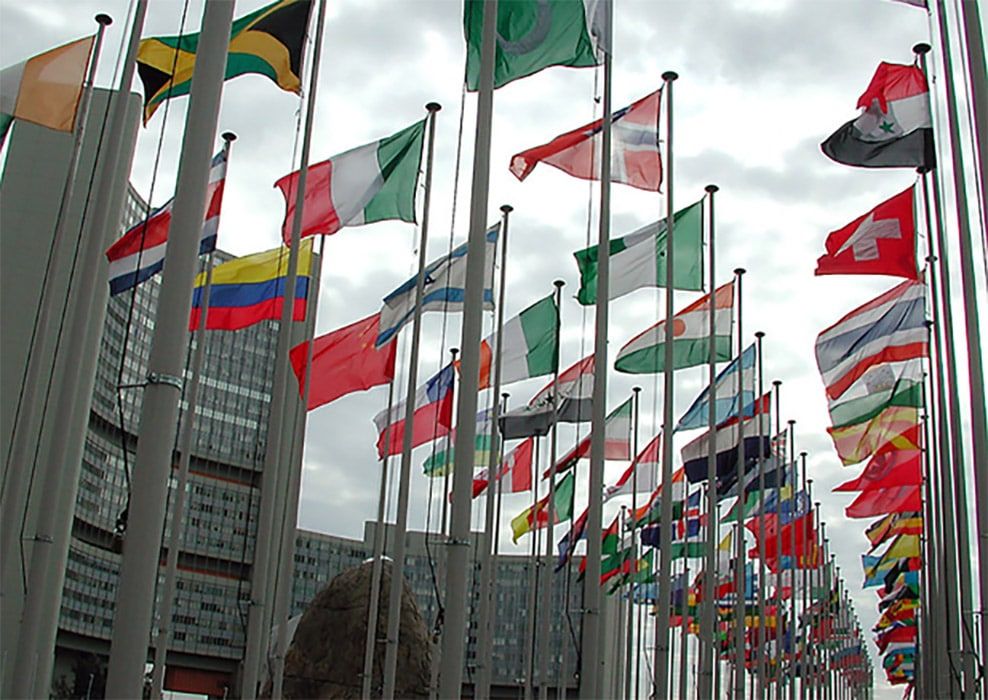The postponed 2020 NPT Review Conference: A modest proposal
By Tariq Rauf | June 2, 2020
 Member States flags adorn the entrance of the Austria Center, venue for general conferences of the International Atomic Energy Administration (IAEA) in Vienna. Image courtesy Dean Calma/IAEA
Member States flags adorn the entrance of the Austria Center, venue for general conferences of the International Atomic Energy Administration (IAEA) in Vienna. Image courtesy Dean Calma/IAEA
On May 13, the Bulletin published a detailed and sober assessment by Robert Einhorn on the situation regarding the Nuclear Non-Proliferation Treaty (NPT) and its review conference, originally scheduled to begin April 27, 2020 but postponed to next year due to the coronavirus pandemic. Einhorn wisely advised that the parties who will be attending use the time between now and the proposed new conference dates of January 4–29, 2021 to work on narrowing their differences over key issues—such as the pace of nuclear disarmament, or the establishment of a Middle East free of all weapons of mass destruction.
To recap what was contained in the article, it described the US perspective on some of the problems between China, Russia, and the United States that are holding up progress in nuclear disarmament; supported the Trump administration’s initiative on Creating the Environment for Nuclear Disarmament (CEND); and downplayed the significance of the 2017 Treaty on the Prohibition of Nuclear Weapons, or TPNW—also known as the “ban treaty”—a treaty which has been adopted by 122 non-nuclear weapon states but opposed by the nuclear-armed ones.
To build bridges between the various sides, Einhorn advised that they adopt the International Atomic Energy Agency (IAEA) Additional Protocol as the universal safeguards verification standard; agree on criteria governing withdrawal from the NPT; highlight peaceful uses of nuclear technologies; and (to mix metaphors) bring to the table some “gift baskets”—voluntary commitments by individual countries to strengthen their implementation of the NPT. And he outlined possible alternatives to the traditional goal of the review conference, which has always been to produce a consensus-based final document.
While all these proposals merit consideration, achieving them requires overcoming some significant differences in perspectives. Let’s take up in turn each potential pitfall that I foresee: nuclear disarmament, the IAEA Additional Protocol, gift baskets, and so-called outcome documents. I also make a modest proposal: Postpone the next NPT conference until 2022—and hold it in Vienna.
Nuclear disarmament. The US-sponsored CEND initiative, involving some 40-to-50 hand-picked states, is fatally flawed because it totally ignores the various steps, measures, and actions that have already been agreed by consensus in the NPT review conferences of 1995, 2000, and 2010. Even though several of the items that were agreed-upon back in those heady years—such as the Anti-Ballistic Missile Treaty, the 2002 Strategic Arms Reduction Treaty II, and the Intermediate-Range Nuclear Forces Treaty, to name just a few—have subsequently been discarded by Russia and the United States (or never entered into force, in the case of START II), there is still room to implement other measures. These measures include reductions in nonstrategic nuclear weapons, reducing the operational status of strategic nuclear weapons, diminishing their role in security policies, placing excess fissile material under IAEA monitoring, providing security assurances for nuclear-weapon-free zones, and ensuring that any reduction in the number of nuclear weapons is irreversible.
Though implementing these measures will not be easy in the current political climate, efforts must still be made to honor past commitments.
IAEA Additional Protocol. The good news is that the Additional Protocol has already been adopted as the “verification standard” by 125 non-nuclear weapon states, as can be seen in the latest IAEA Safeguards Implementation Report.
The bad news is that Argentina and Brazil still have not adopted the protocol, maintaining that their bilateral safeguards system is the protocol’s equivalent—a position that has been accepted by the United States.
Meanwhile, Egypt has conditioned its acceptance of the protocol on Israel’s becoming a non-nuclear weapon state.
And by dumping the Joint Comprehensive Plan of Action, the United States put Iran’s provisional implementation of the protocol in jeopardy.
Gift baskets. The purely voluntary commitments known as “gift baskets” are a fairly recent development, invented for the four Nuclear Security Summits initiated by President Obama in 2010. But while laudable in intent, they are essentially an uncoordinated conglomeration of efforts by different states, and are not uniformly applicable or accepted by all states. Consequently, the outcomes of the four Nuclear Security Summits were not accepted by the IAEA Member States that were not invited, so IAEA Ministerial Conferences on nuclear security had to be subsequently be convened to promote uniform acceptance of certain measures through minimalist ministerial declarations. This may seem like a semantic point, but ministerial declarations reflect the minimum possible level of agreement.
In contrast, the NPT is a near-universal treaty with an established review process that has yielded consensually agreed measures to strengthen its implementation. The introduction of gift baskets therefore would bring a mishmash of different commitments and destroy the practice of commonly agreed NPT commitments.
Outcome documents are essential. The success of an NPT review conference ultimately rests on the adoption of an agreed final document.
Einhorn’s essay claimed that the time-consuming search for the consensus required to produce an outcome document often leads to the lowest common denominator. To remedy that, Einhorn has suggested that, among other possibilities, a report be submitted that lists all recommendations and proposals that were submitted; this report would then be circulated at the end of the review conferences, without putting them up for adoption or approval.
He also made the case for a high-level, or ministerial, statement reaffirming commitment to the NPT at the next review conference, with the idea that this would avoid the appearance of a band-aid solution, such as the unwieldy compromise final document of 1985 that included both divergent views on nuclear disarmament and dissenting statements by states.
It is my view—and also that of Jayantha Dhanapala, president of the 1995 NPT Conference—that merely listing or restating positions without seeking agreement through consensus would be acting contrary to the precepts of the strengthened review process established in 1995–2000. This existing process, which has been in place for over a decade now, has successfully produced far-reaching final documents in 2000 and 2010.
Consequently, a ministerial statement would not suffice.
Postpone the next NPT Review Conference until 2022. Despite the continuing differences between states, we must persevere in defending the NPT and implementing the remaining elements of the previous consensus outcome documents.
To do so it may be time to think outside the box and try something ambitious: Hold the review conference in 2022, not 2021, during the April–May time frame previously scheduled for the first session in Vienna of the Preparatory Committee for the 2025 review conference—and to add two weeks to the regular proceedings to enable 20 working days.
The reasoning in simple: There is no overly pressing matter that needs to be resolved at the review conference, which in any case has been postponed to 2021. So, instead of scrambling for dates in 2021 that might still need to be changed at some point down the road due to the coronavirus, we could plan on holding the review conference in 2022. This would relieve some of the scheduling pressure and take away the uncertainty of dates in 2021. (In addition, a one-day Preparatory Committee session could be included in that same time period, to agree on procedural matters for the next set of sessions.)
As for choice of venue, the only international organization to which the NPT accords a formal role is the Vienna, Austria-based International Atomic Energy Agency—which is mandated to implement safeguards or verification of the nonproliferation obligations of the non-nuclear weapon states. Using nuclear technologies for peaceful purposes by such states—especially developing countries—in practice has come to be implemented through the technical cooperation program of the IAEA.
And there are many states involved in these programs; currently, there are 848 active technical cooperation projects at the IAEA underway, covering development priorities in areas such as nuclear safety, nuclear security, nuclear power generation, nuclear waste disposition, and nuclear sciences. So, the organization holds an established track record, with a high level of awareness of the issues involved with nuclear weaponry.
Furthermore, compliance with the NPT’s nonproliferation obligations is not done in the NPT review process but in Vienna by the IAEA; its assessment is released in the annual Safeguards Implementation Report. The IAEA’s annual reports on nuclear safety, nuclear security, the technical cooperation program, and nuclear technology are reviewed in Vienna at the General Conference. And the Comprehensive Nuclear Test Ban Treaty Organization in Vienna is the logical venue to discuss any issues related to nuclear weapon testing.
At present, the required conditions are absent to hold the review conference in January 2021 or even later that year in New York City. Consequently, the NPT review conference can easily be postponed to April–May 2022 in Vienna without any adverse implications for the NPT review process. There are no insurmountable obstacles to holding the review conference in 2022 in Vienna, other than mental blocks and policy inertia.
Together, we make the world safer.
The Bulletin elevates expert voices above the noise. But as an independent nonprofit organization, our operations depend on the support of readers like you. Help us continue to deliver quality journalism that holds leaders accountable. Your support of our work at any level is important. In return, we promise our coverage will be understandable, influential, vigilant, solution-oriented, and fair-minded. Together we can make a difference.
Keywords: IAEA, NPT, NPT Review Conference, Nuclear Non-Proliferation Treaty, nuclear disarmament
Topics: Nuclear Weapons, Opinion















